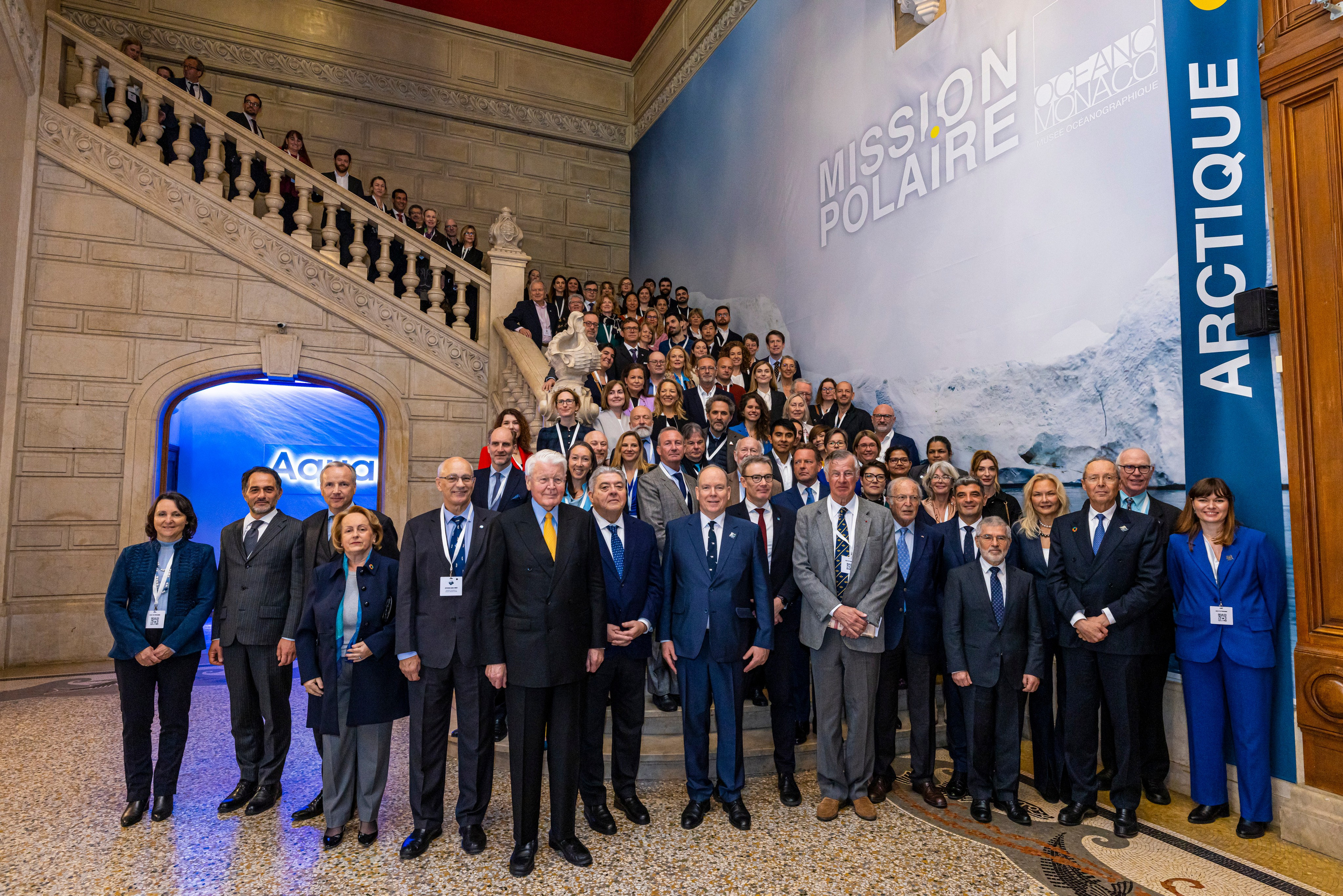
The Polar Symposium 2024 “From Arctic to Antarctic: The Cold is Getting Hot!” took place on 22-23 February in Monaco. The Symposium was organized by the Prince Albert II of Monaco Foundation with the Scientific Committee on Antarctic Research (SCAR) and the International Arctic Science Committee (IASC) as co-conveners, in collaboration with the Oceanographic Institute of Monaco — the Prince Albert I Foundation, the Scientific Center of Monaco, the European Polar Board, and the World Economic Forum. The second edition of the Symposium, following the 2022 launch of the Polar Initiative, convened nearly 120 polar scientists, early career researchers, Indigenous leaders, and NGO representatives. Anchor and journalist Genie Godula hosted the Symposium. Two days of the Polar Symposium featured a series of speeches and presentations.
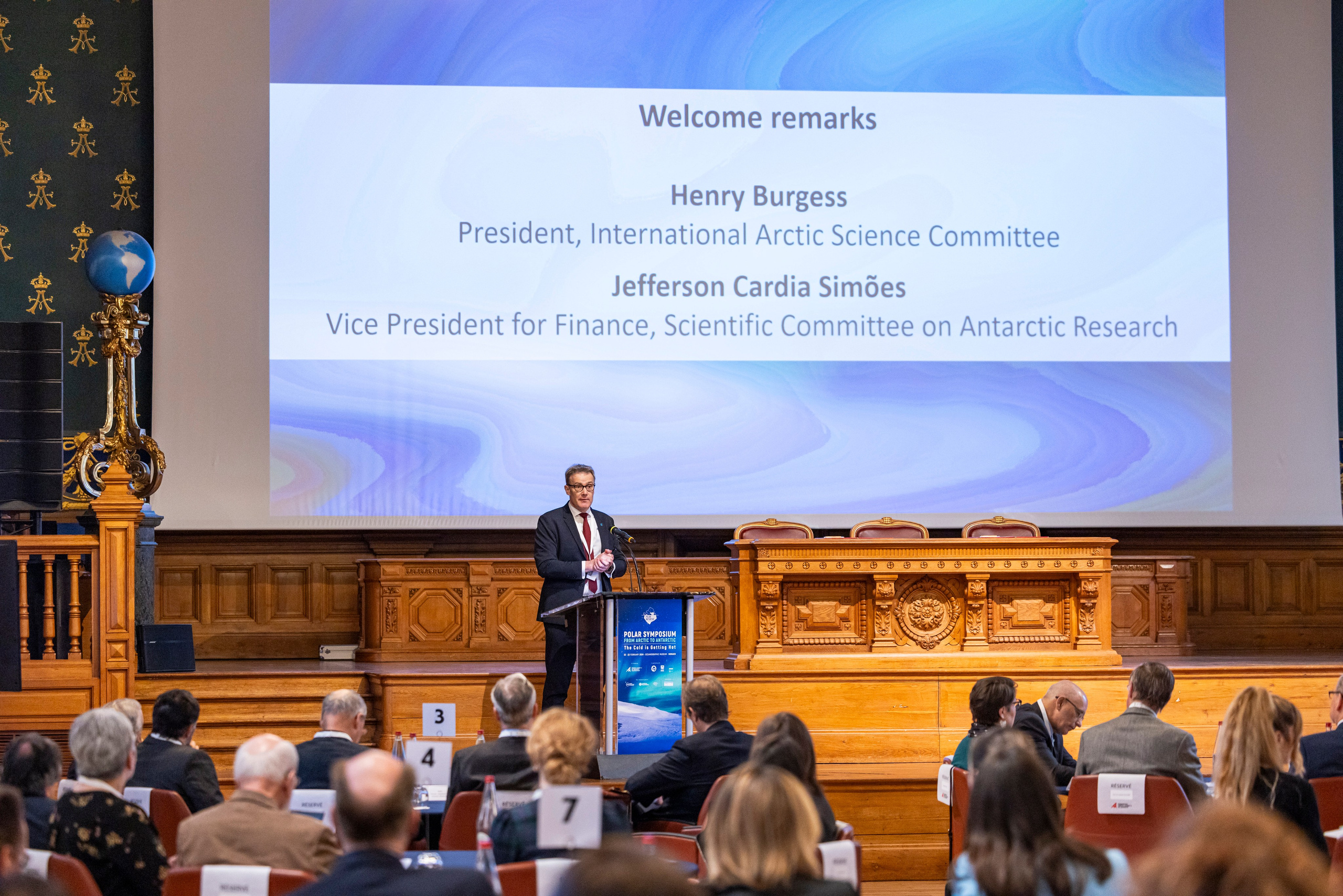
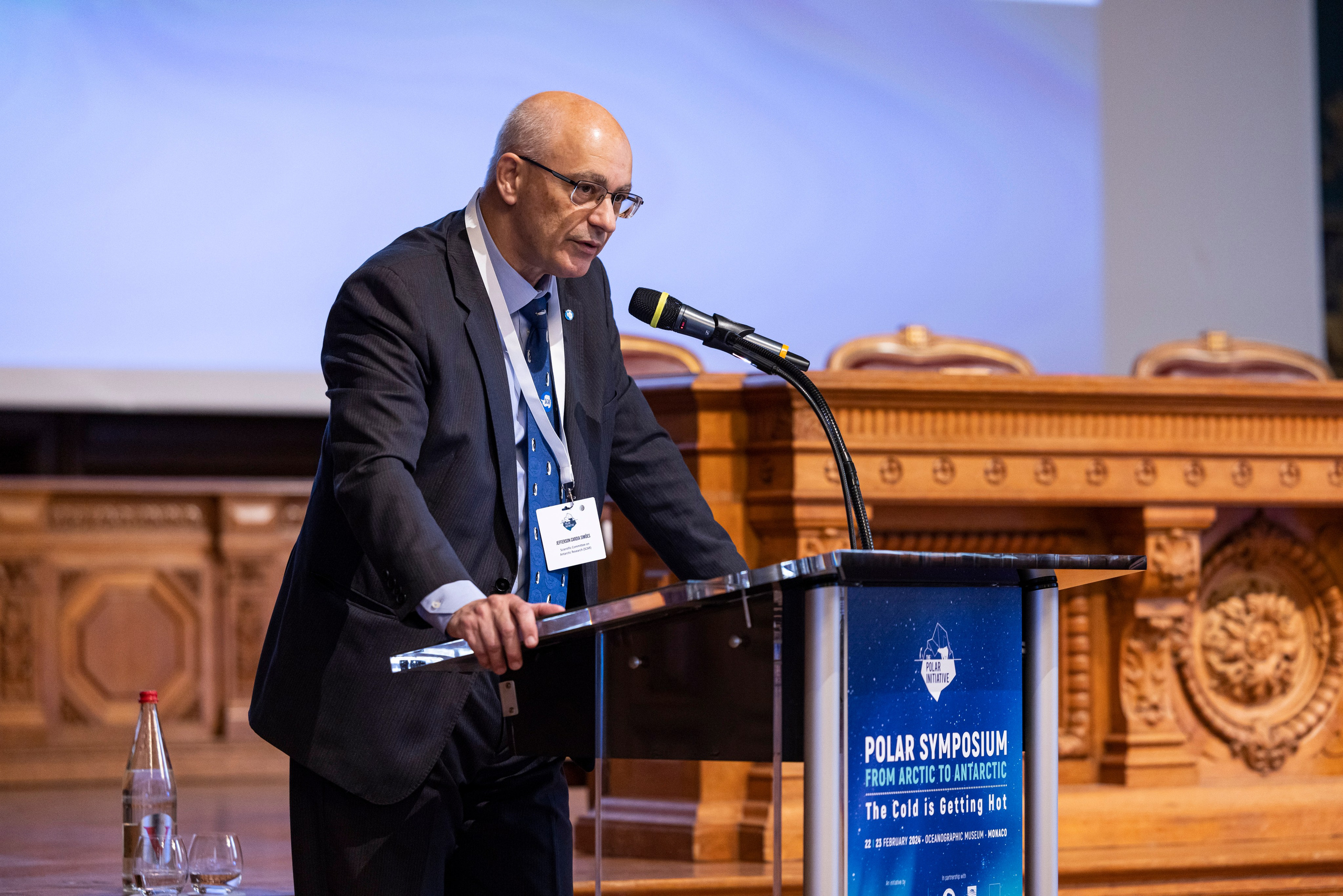
Welcome Remarks, SCAR and IASC representatives
- Henry Burgess, President, International Arctic Science Committee (IASC)
- Jefferson Cardia Simões, Vice President for Finance, Scientific Committee on Antarctic Research (SCAR)
In welcome remarks, Henry Burgess pointed out that the Polar Symposium offers a rare opportunity to unite the Arctic and Antarctic communities. Burgess also emphasized IASC’s mission of investing in early career researchers and promoting Arctic science across diverse disciplines and regions within the Arctic.
Jefferson Cardia Simões highlighted the vital role polar regions play in maintaining the planet’s environmental balance while impacting our daily lives. Today, the rapid changes in climate intersect with increased demand for natural resources, shifts in land use, global economic instability, armed conflicts, and unique geopolitical scenarios in the Arctic. Simões also pointed out the importance of discussing international cooperation for both polar regions, as it ensures interdisciplinary collaboration and shapes scientific policy priorities. The speaker stated that “science diplomacy is one of the polar community’s noblest roles.” To fulfill this role, Simões suggested, we need a multidisciplinary approach that combines scientific ideas with attention to social issues.
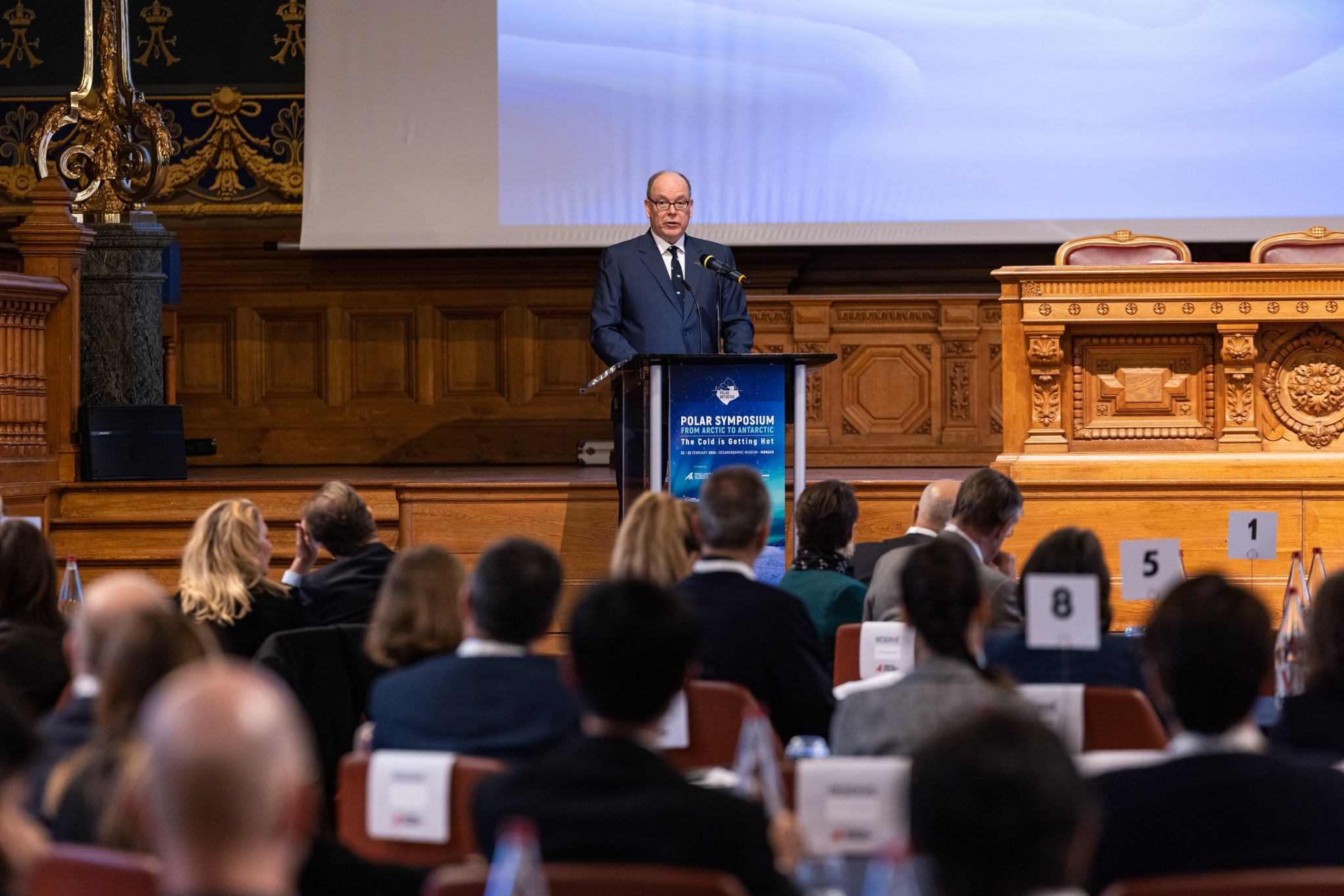
Welcome address, HSH Prince Albert II of Monaco
In his welcome address, HSH Prince Albert II of Monaco paid tribute to his great-great-grandfather Prince Albert I, who led scientific expeditions to the Arctic 150 years ago. Today, the Oceanographic Institute of Monaco, the Scientific Centre of Monaco, and the Prince Albert II of Monaco Foundation continue to follow in his footsteps, making Monaco an advocate for polar conservation. HSH Prince Albert II expressed regret over the challenge of fully grasping the significance of these regions for the rest of the planet and the noticeable gap between the urgency of the situation and the timid measures taken. HSH Prince Albert II highlighted the mission of the Polar Initiative, established in 2022, to facilitate unprecedented dialogue among Arctic and Antarctic experts, aiming to catalyze broad exchanges by integrating disciplines, expertise, and skills. This involves incorporating contributions from Indigenous Peoples and local communities; promoting cooperation, partnerships, and co-funding; and fostering stronger collaboration, still too rare, between experts in both polar regions. HSH Prince Albert II viewed the emphasis on science in Antarctica as a model where science takes precedence over everything—a philosophy reflected in the Antarctic Treaty, which prioritizes science and peace over geopolitical tensions, and the protection of the Poles over exploitation. HSH Prince Albert II also encouraged NGOs and businesses to contribute to the protection of polar regions.
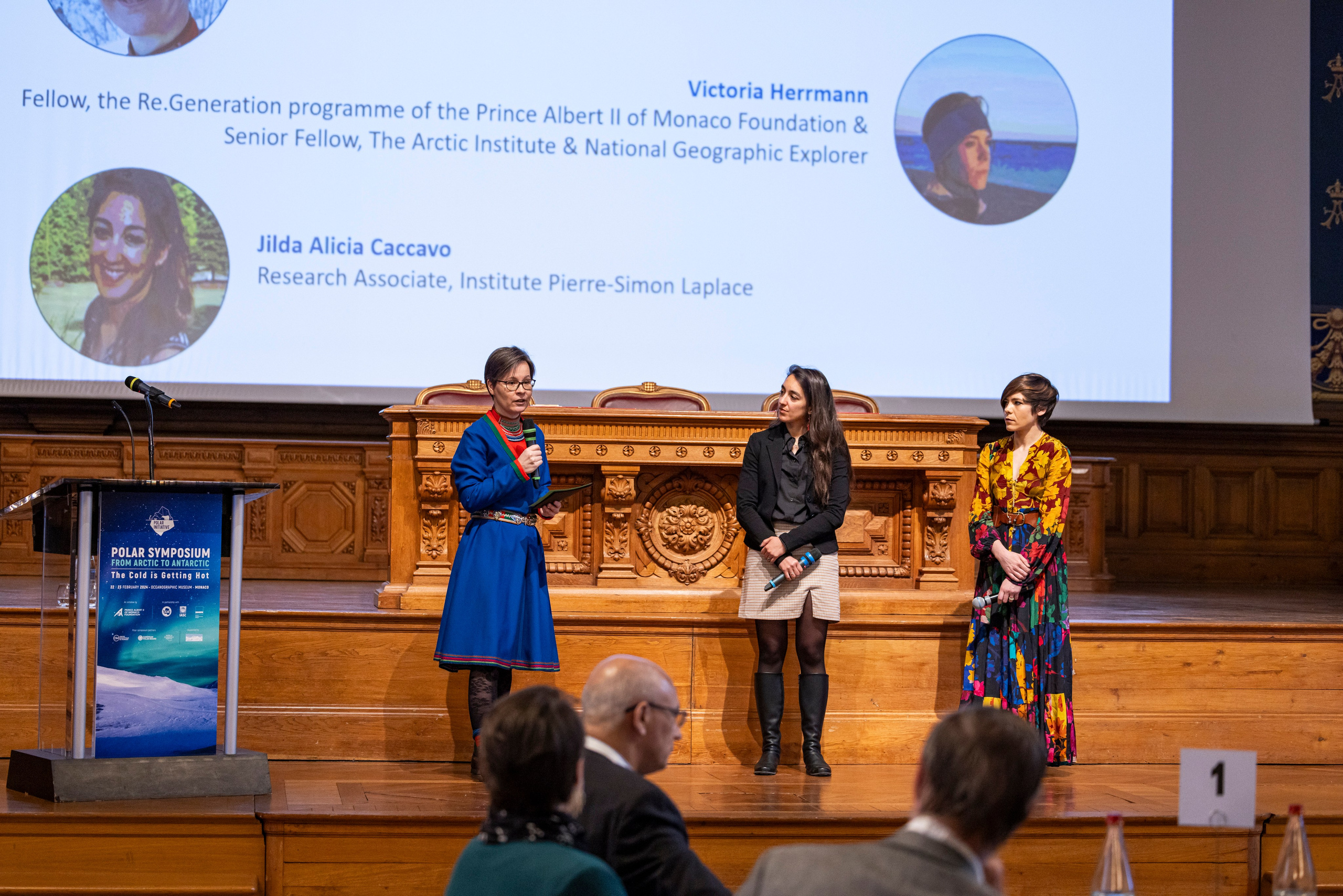
Kick-off of the Symposium
- Victoria Herrmann, Fellow, the Re.Generation Program of the Prince Albert II of Monaco Foundation & Senior Fellow and Leadership Group member, The Arctic Institute
- Jilda Caccavo, Research Associate, Alfred Wegener Institute Helmholtz Centre for Polar and Marine Research & Institute Pierre-Simon Laplace
- Elle Merete Omma, Head of EU Unit, Saami Council
At the commencement of the Symposium, three speakers discussed the global importance of the Poles, the challenges specific to polar regions, and optimal strategies for addressing these challenges.
Elle Merete Omma conveyed that in Saami cosmology, humans are regarded as integral components of nature rather than superior entities, and their role is to preserve harmony within the ecosystem rather than exert dominance. Omma pointed out the imperative to protect Indigenous Peoples as guardians of nature, advocating for their inclusion at decision-making tables as experts.
Jilda Caccavo discussed how climate change is amplifying variability, necessitating species to adapt to a broader range of environmental conditions. The speaker underscored the significance of safeguarding the Southern Ocean from fisheries and tourism expansion into the pristine parts of Antarctica. In addition to other key points, Caccavo highlighted the importance of investing in early career researchers within the scientific ecosystem by providing stable and secure positions in polar science. The speaker argued that this approach is not only a moral imperative but also the most effective method to address the crucial questions required to confront the crisis in the Poles.
Victoria Herrmann encouraged the audience to reflect on the places that matter most to them, as their destiny is intricately linked to both the Arctic and Antarctic. The speaker delved into the concept of the geography of time, emphasizing the need to address short-term and long-term challenges posed by climate change simultaneously, such as facing storms and planning for the next hundred years. Herrmann highlighted the importance of diverse collaborations and fostering hope while educating the public about the global impact of the Poles.
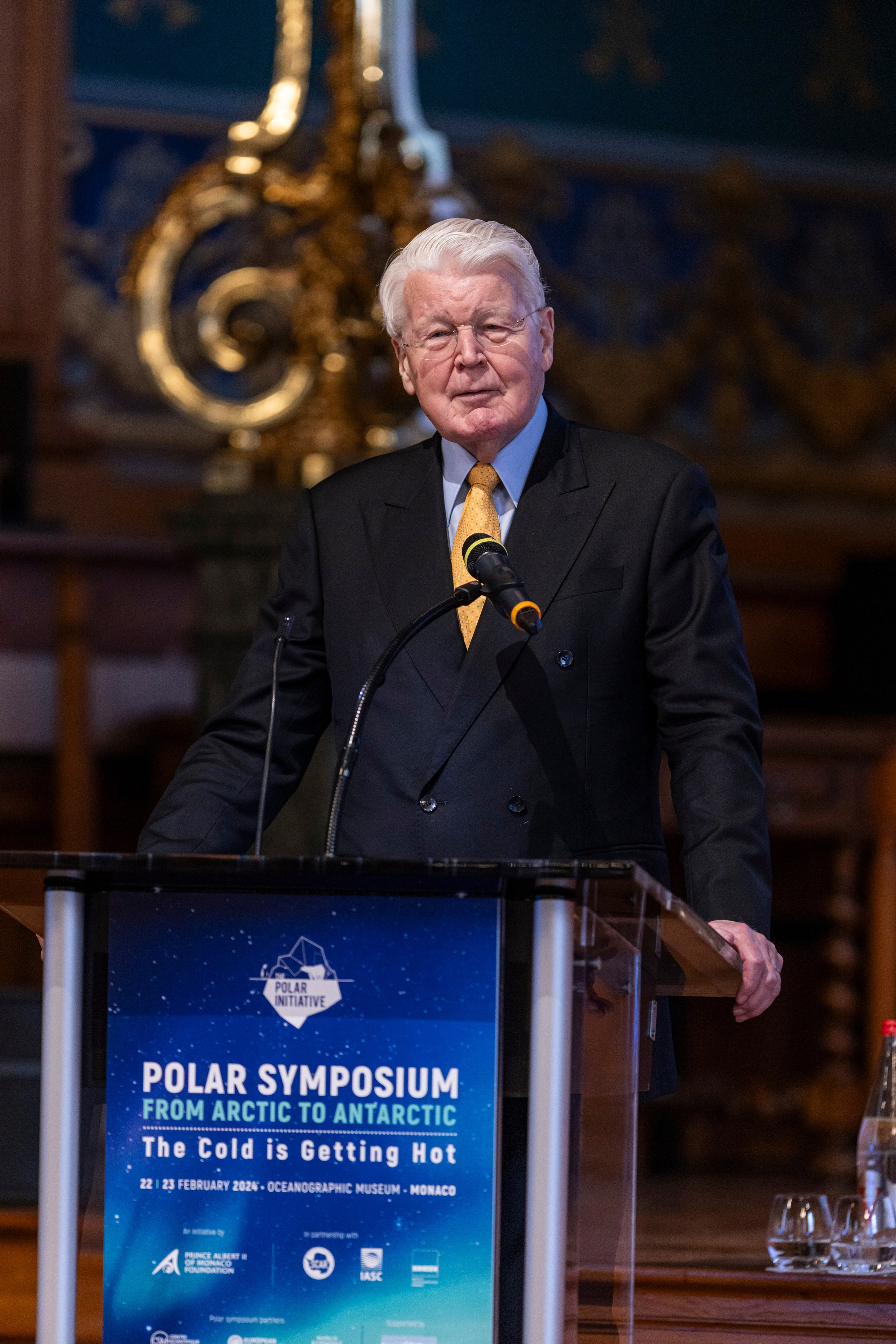
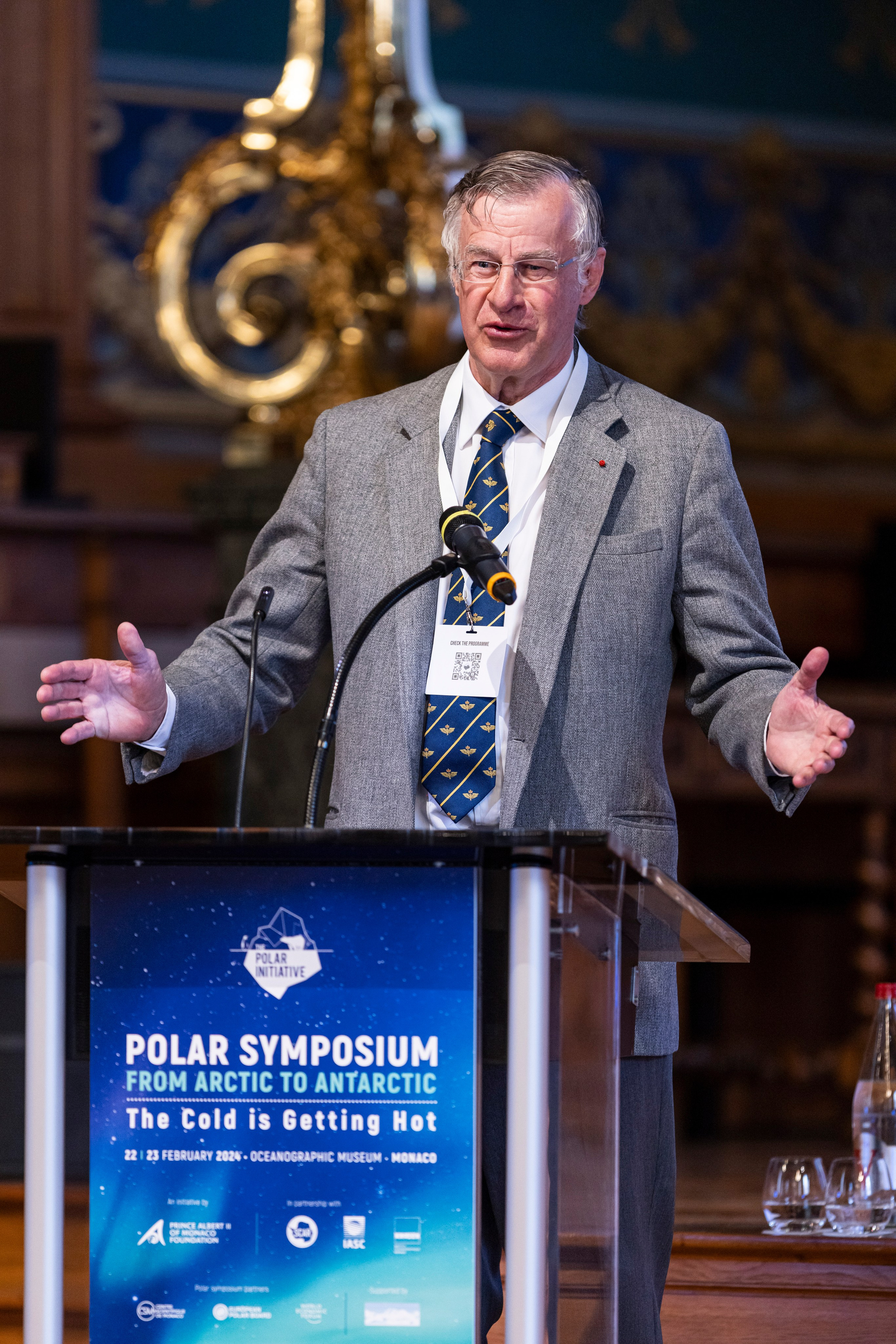
Keynote remark, H.E. Ólafur Ragnar Grímsson, Chairman, Arctic Circle
In his keynote remark, H.E. Ólafur Ragnar Grímsson expressed gratitude to HSH Prince Albert II for his early support of the Arctic Circle initiative a decade ago. The speaker recognized that the concept of climate can be challenging for the general public to understand and suggested focusing on ice as a more tangible indicator of climate change. Grímsson highlighted that the melting of ice serves as the primary indicator of the global climate emergency, a phenomenon understandable to people worldwide. The speaker encouraged engagement with other ice-covered regions, such as the Himalayas, and called for embracing the advancing scientific capabilities of leading Asian countries, including Korea, China, and Japan. Grímsson stated that the increasing focus on ice-covered regions by COP leadership and the centering of polar issues by a G7 country leader — President of France Emmanuel Macron at the Polar Summit in Paris in November 2023 — represented a historic opening. Grímsson emphasized that this symposium is a crucial part of this journey, aligning with the growing attention to polar regions.
Keynote remark, Prof. Dr Frederik Paulsen, Founding Member, Albedo Foundation & Chair, UArctic
In the following keynote remark, Frederik Paulsen presented new Albedo Foundation dedicated to supporting Francophone polar research. The initiative has received backing from President Macron and will be seeking private donors in the near future. If this endeavor proves successful, there are plans to expand its operations to Germany and the UK.
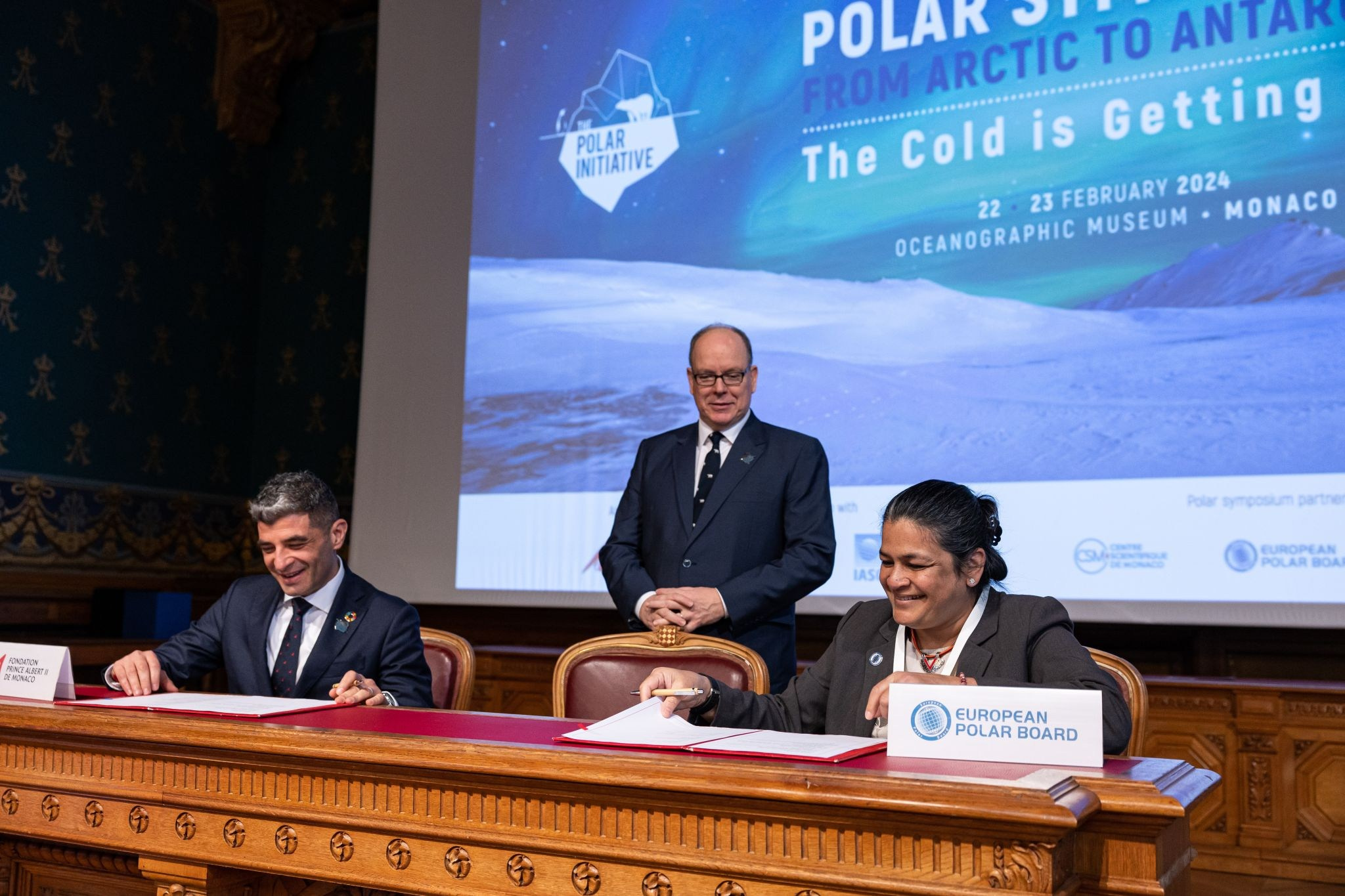
On the first day of the Symposium, three memorandums of understanding and strategic collaborations were signed: one between the Prince Albert II of Monaco Foundation and the European Polar Board, another between the Alfred Wegener Institute for Polar and Marine Research and the Oceanographic Institute of Monaco, and the third between the Alfred Wegener Institute and Monaco Scientific Center.
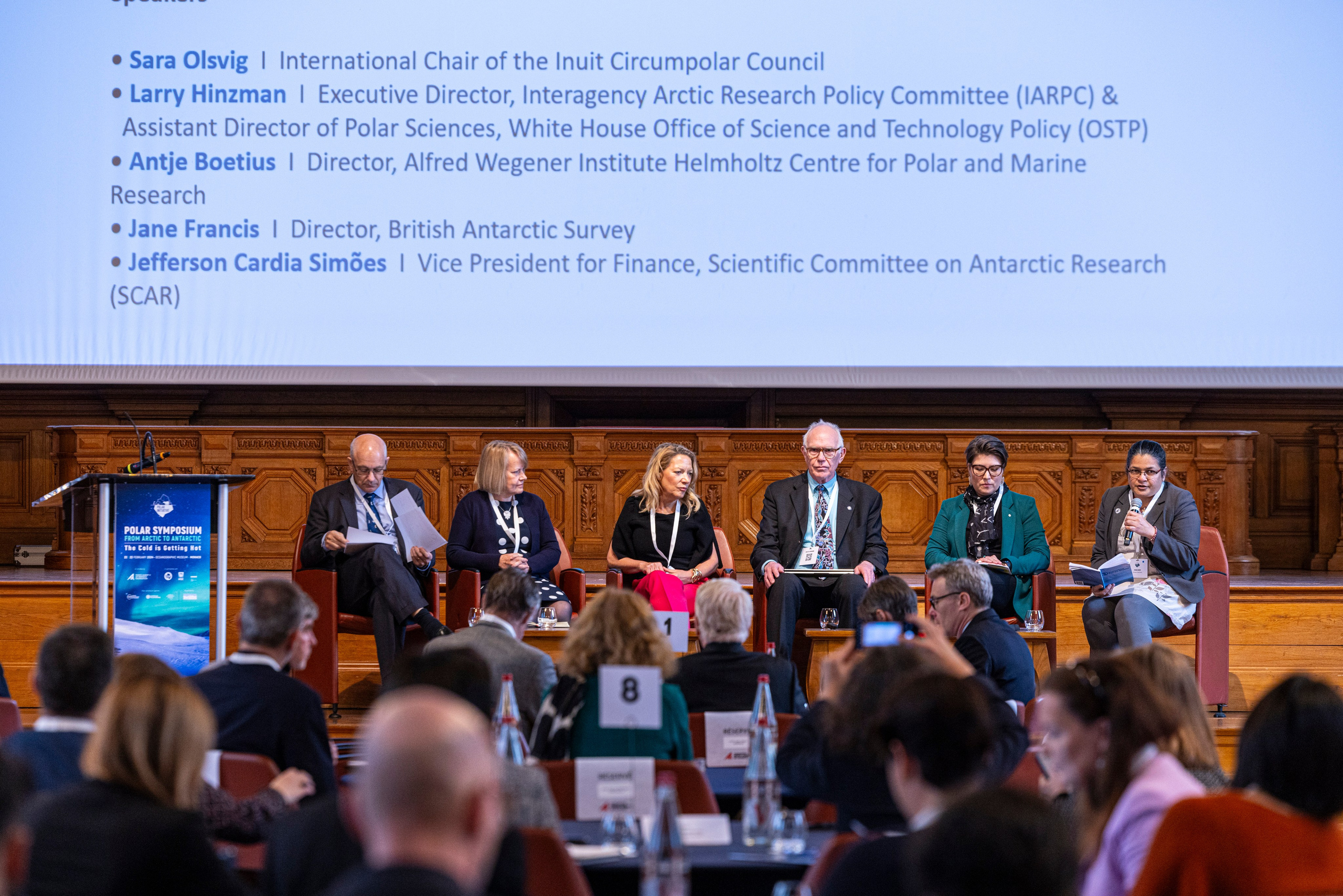
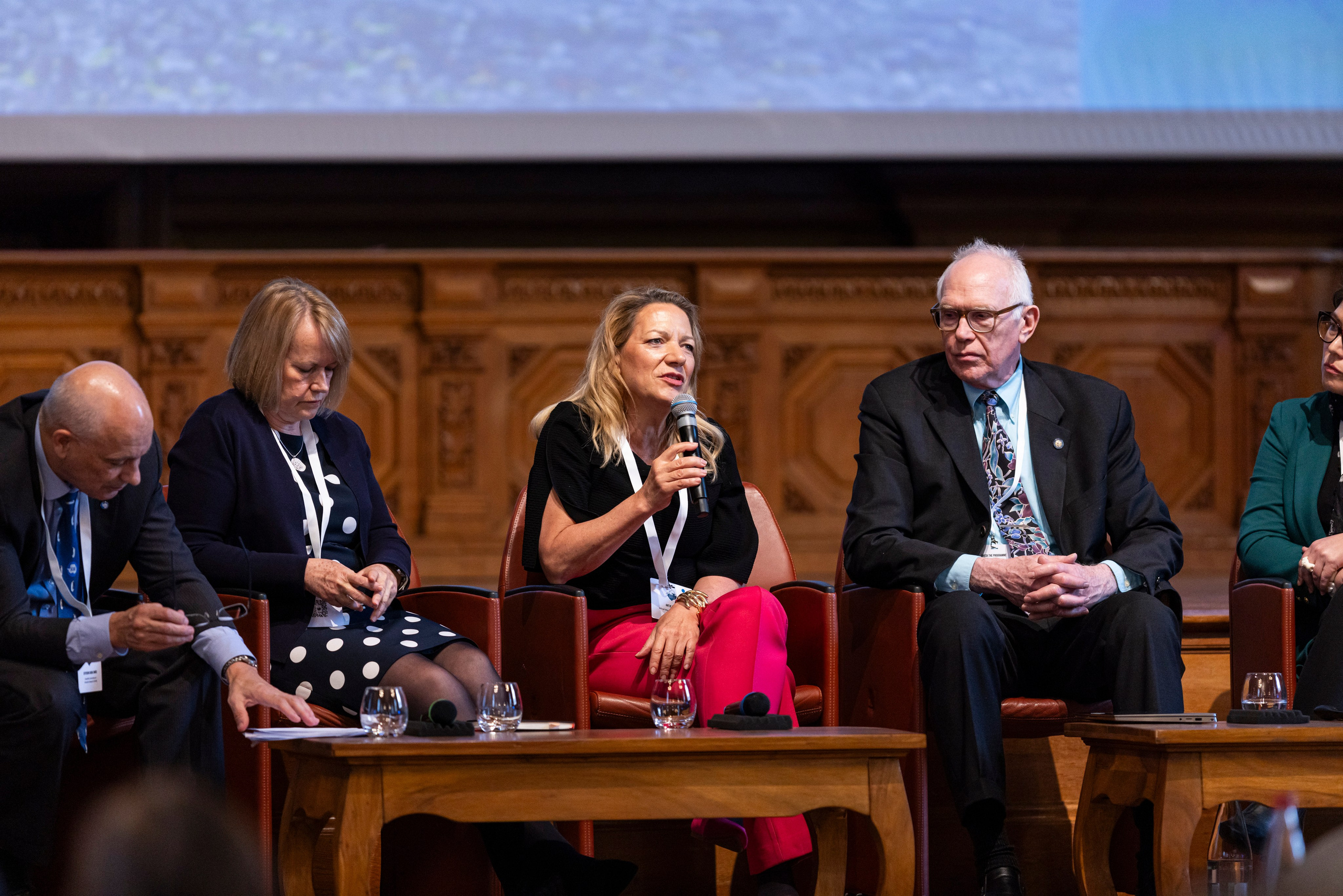
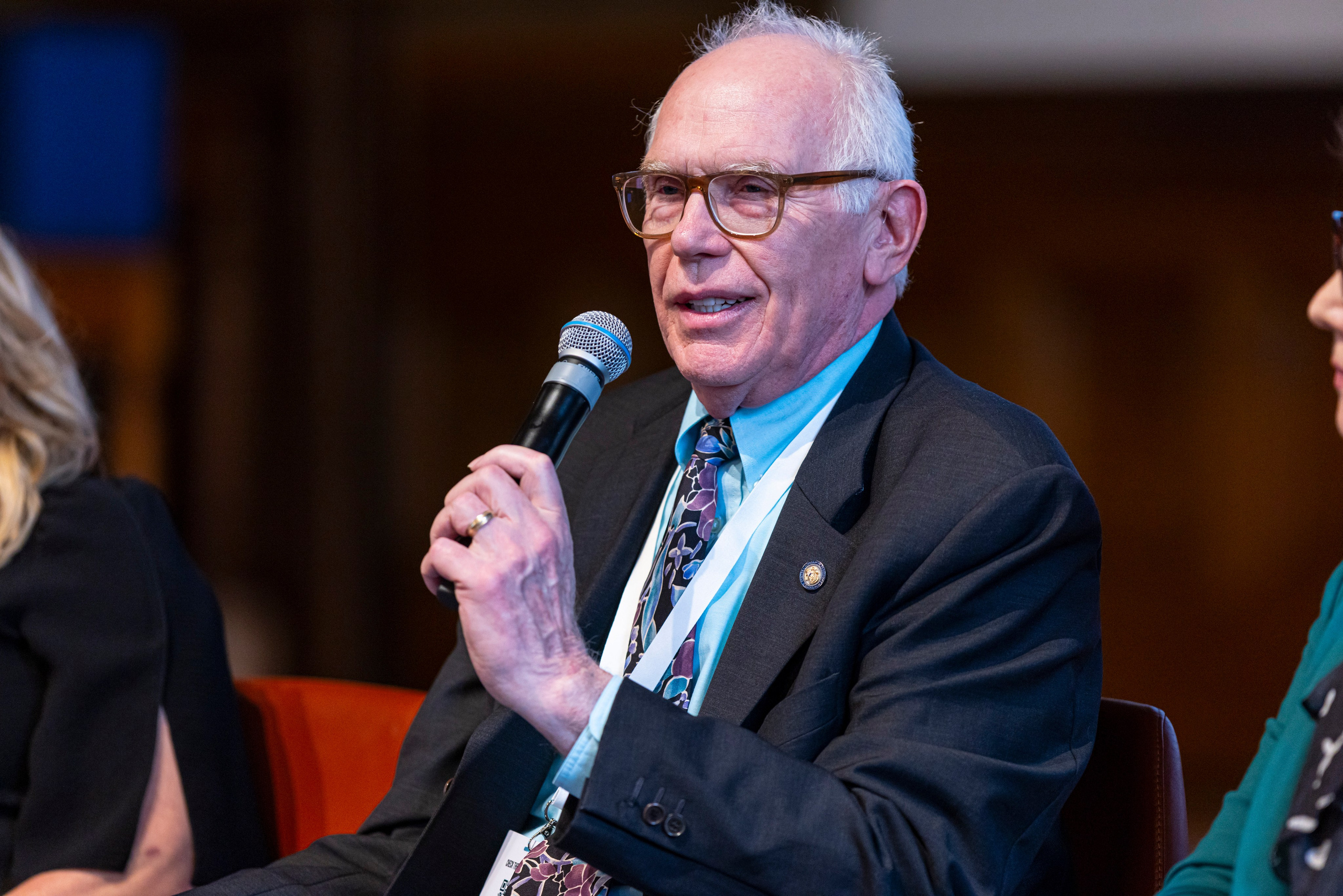
Panel 1 “Long-term Collaborations in the Polar Regions: Upcoming initiatives for the next decade”
- Renuka Badhe, Executive Secretary, European Polar Board (moderator)
- Sara Olsvig, International Chair of the Inuit Circumpolar Council
- Larry Hinzman, Executive Director, Interagency Arctic Research Policy Committee (IARPC) & Assistant Director of Polar Sciences, White House Office of Science and Technology Policy (OSTP)
- Antje Boetius, Director, Alfred Wegener Institute Helmholtz Centre for Polar and Marine Research
- Dame Jane Francis, Director, British Antarctic Survey
- Jefferson Cardia Simões, Vice President, Scientific Committee on Antarctic Research (SCAR)
During the first panel discussion, the panelists underscored the significance of integrating Indigenous knowledge and epistemologies into scientific research and governance. They delved into three prominent initiatives in polar science: Antarctica InSync, ICARP IV and SCAR’s preparation for the 5th International Polar Year. The emphasis was placed on the imperative to coordinate observations, align research infrastructure, and facilitate data sharing. The discussion also touched upon the advent of “exciting new science” in the Polar regions, driven by technological advancements like robotics, autonomous vehicles, and satellites. The speakers advocated for global and interdisciplinary collaboration, as well as the cultivation of a new generation of polar scientists through a collaborative spirit. Additionally, they stressed the necessity of long-term planning and funding for polar science, with a particular focus on equity and the active Indigenous participation.
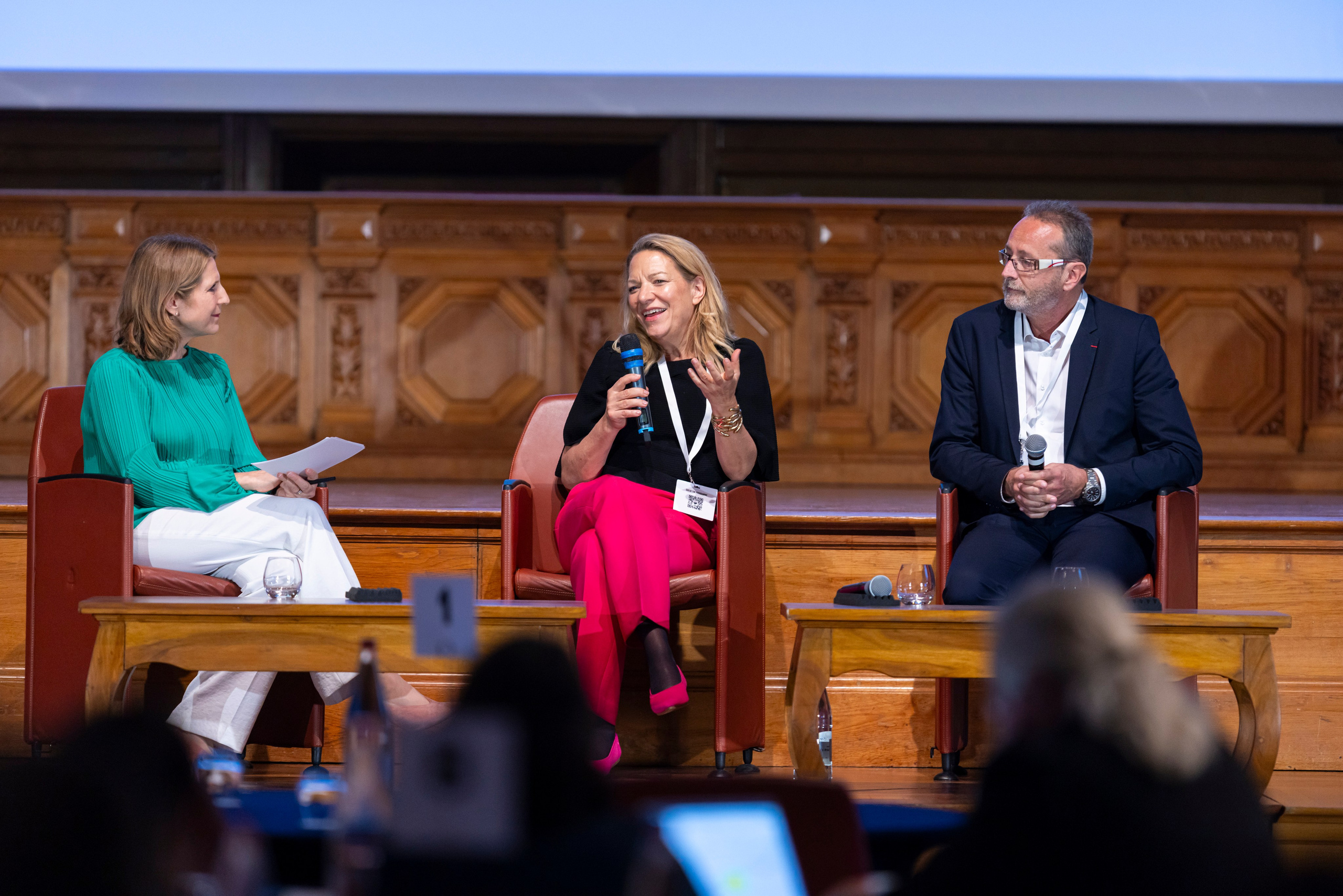
Conclusions of One Planet — Polar Summit
- Jérôme Chapellaz, Full Professor, Ecole Polytechnique Fédérale de Lausanne (EPFL)
- Antje Boetius, Director, Alfred Wegener Institute Helmholtz Centre for Polar and Marine Research
Discussing the conclusions of One Planet — Polar Summit that took place in Paris on 8-10 November 2023, speakers highlighted a notable outcome: the direct interaction between scientists and policymakers. Polar scientists engaged directly with heads of state, aiming to position science at the core of policy considerations. Policymakers were identified as instrumental in organizing international projects and platforms for diverse forms of collaboration. Scientists, in turn, must confront uncertainties to effectively respond to policy demands. Some weaknesses in polar sciences were acknowledged, including issues with the reporting system and gaps in snow science. The discussion also addressed the challenge of reducing CO2 emissions from research infrastructure through automation and sharing existing facilities. Encouragingly, the positive trend of increased investment in polar science in France and the United States was highlighted as promising.
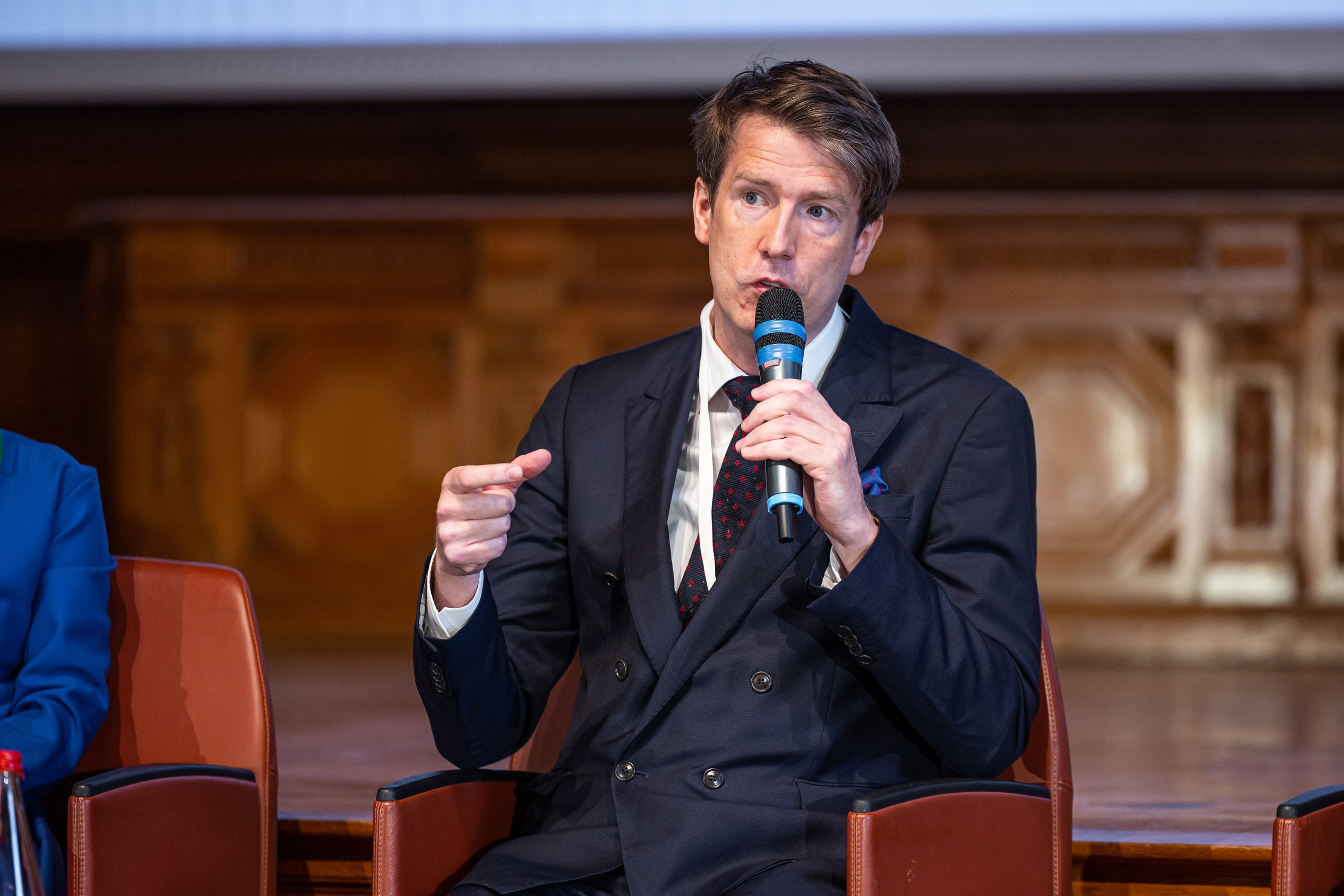
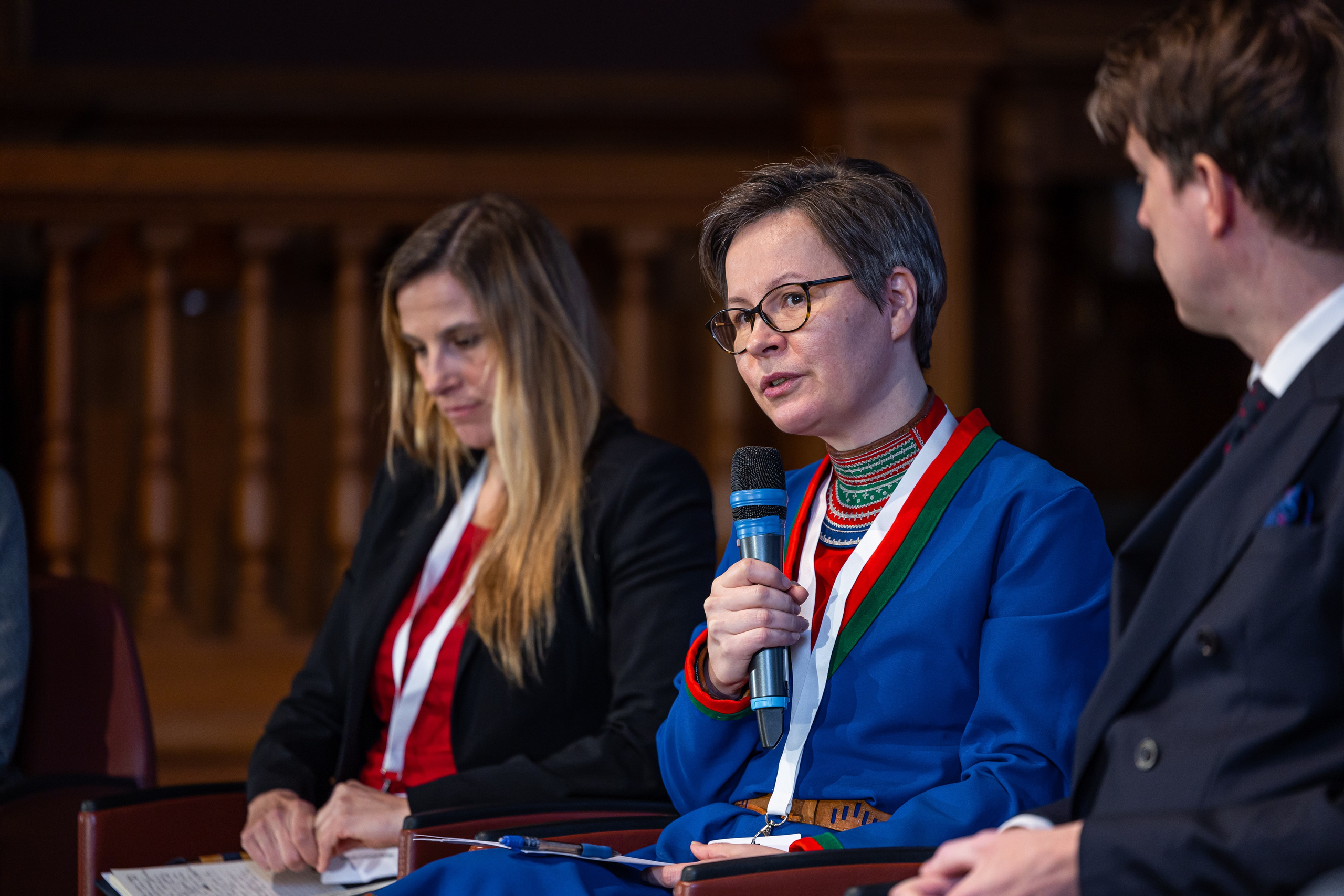
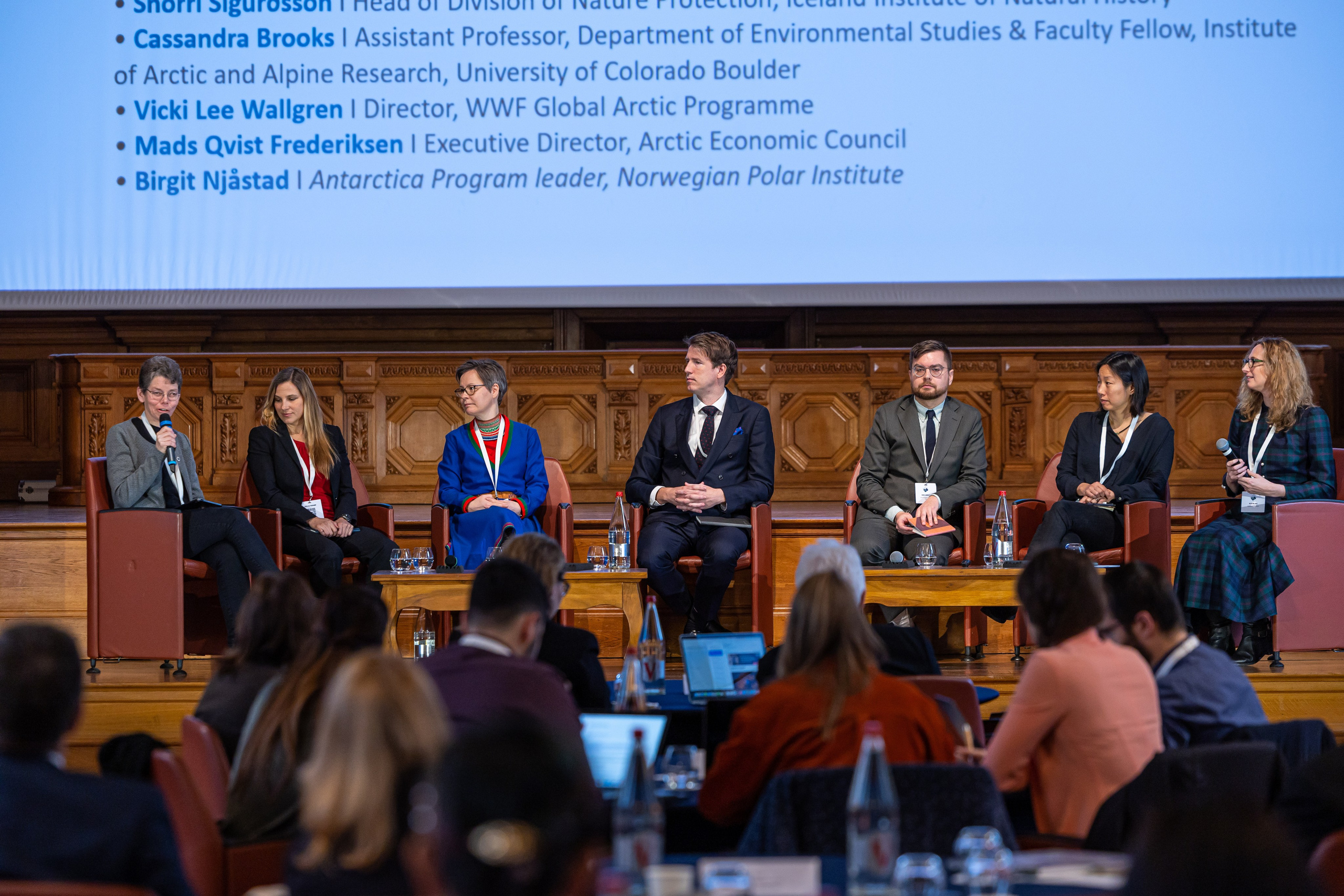
Panel 2 “Impact of Human Activities on Polar Biodiversity, Societies and Economies: Need for Indigenous Knowledge and Robust Scientific Data to Underpin Policy”
- Helen Millman, World Economic Forum Hoffmann Fellow for the Poles, University of Exeter (moderator)
- Elle Merete Omma, Head of EU Unit, Saami Council
- Snorri Sigurðsson, Head of Division of Nature Protection, Iceland Institute of Natural History
- Cassandra Brooks, Assistant Professor, Department of Environmental Studies & Faculty Fellow, Institute of Arctic and Alpine Research, University of Colorado Boulder
- Vicki Lee Wallgren, Director, WWF Global Arctic Programme
- Mads Qvist Frederiksen, Executive Director, Arctic Economic Council
- Birgit Njåstad, Antarctica Program leader, Norwegian Polar Institute
The second panel, co-organized with the World Economic Forum, featured diverse experts with sometimes contradictory perspectives. One focal point addressed the cumulative effects of climate change on ecosystems and human populations, alongside the responses to these changes. Speakers highlighted gaps in both Indigenous and scientific knowledge regarding rapid climate changes, as well as gaps in environmental monitoring and data gathering. It was emphasized that observing and predicting environmental changes on a larger scale must be complemented by adjusting monitoring networks to local conditions and strengthening knowledge hubs at the local level. This brought attention to the alignment between Indigenous, local, and scientific knowledge and value systems. Another issue explored was how climate science can guide policy and the challenges in achieving this goal. Successful examples of collaborative efforts, such as the Antarctic Treaty (1959), the Arctic Council (1996), the Marine Protected Area in Antarctica’s Ross Sea by CCAMLR (2016), the Central Arctic Ocean Fisheries Agreement (2018), and the Arctic Hub (2020), were highlighted. Additional question considered was the growing global needs for food, green energy, and minerals, pondering whether the Poles will be contributors of these resources or if their exceptional status and environmental vulnerability will lead to their conservation. The safeguarding of collaborative efforts in the Poles during global conflicts was deemed essential. Speakers underscored the importance of Antarctica as a territory for science and peace. Another significant takeaway was the emphasis on effective communication with the public to enhance global understanding of the effects of climate change and the importance of both Poles for the rest of the planet.
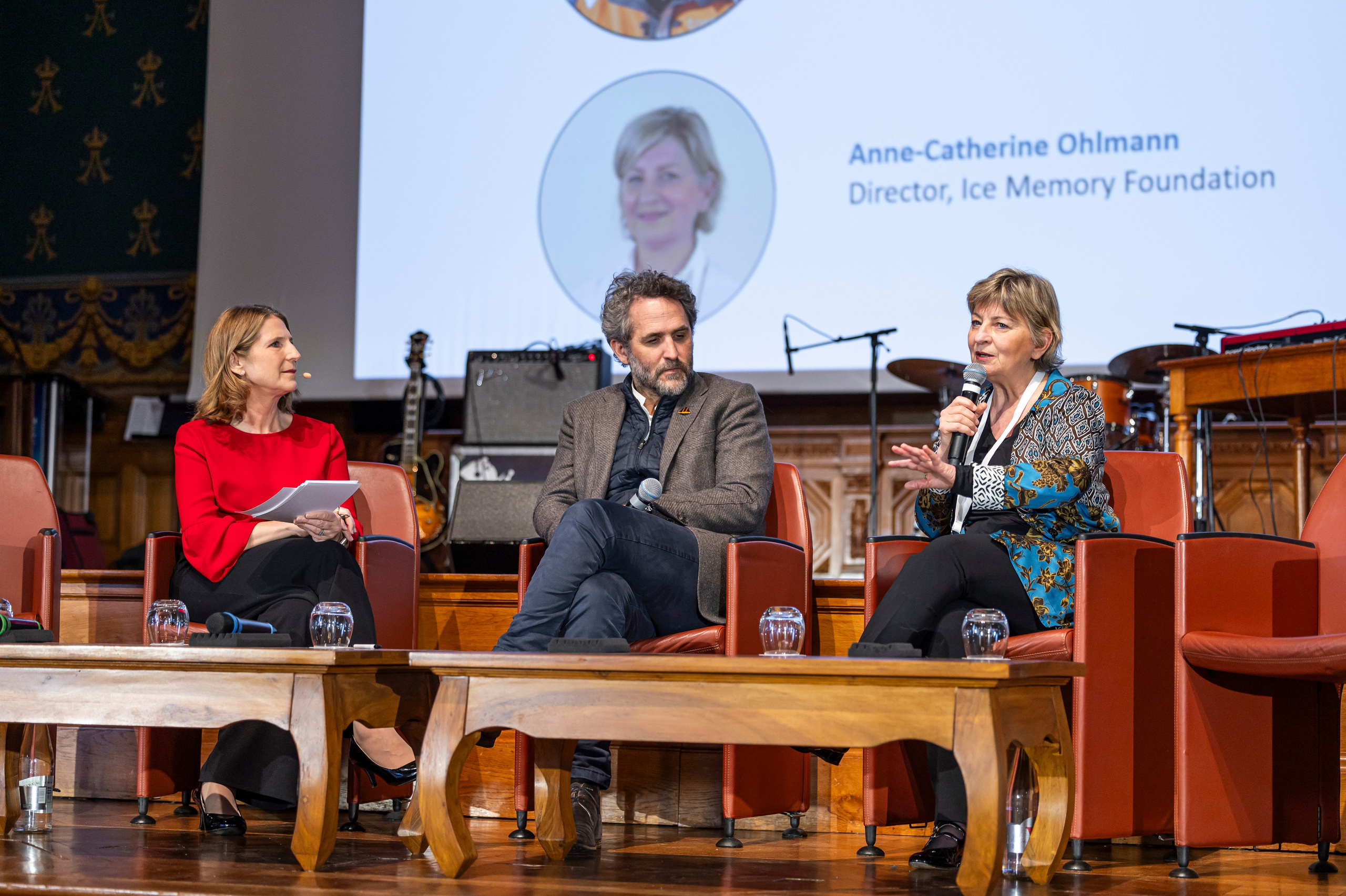
A conversation with
- Romain Troublé, Director, Tara Foundation
- Anne-Catherine Ohlmann, Director, Ice Memory Foundation
During the conversation, Romain Troublé shared that the Tara Foundation supports long-term expeditions dedicated to studying ocean life. Their upcoming project, the Tara Polar Station, is a drifting laboratory equipped with advanced sampling systems and atmospheric sensors both in the ice and underwater. Scheduled to be completed by 2025, this station will host a crew up to 20 members and will be powered by a combination of wind, solar, and decarbonized fuel. Specifically designed to function in temperatures as low as -52°C, it will spend 90% of its time locked in ice, drifting from the north of the Laptev Sea starting in 2026. The station plans to invite artists and journalists during the summer months.
Anne-Catherine Ohlmann discussed the Ice Memory Foundation’s commitment to collecting ice cores from 20 glaciers over a span of 20 years, having drilled eight glaciers so far. The foundation takes two ice cores per glacier — one for scientists and one to be stored in a sanctuary in Antarctica. The challenges here revolve around governance and legal regulations concerning both ice cores and the sanctuary.
The Tara Foundation grapples with technical challenges like pollution management and the human aspects of long stays on ice. Fundraising, particularly securing long-term private funding, proves to be a significant challenge for both organizations. Recognizing the importance of this work, the presenters stressed the role of science in informing decision-makers for the benefit of humanity. Among the plans are the establishment of environmental heritage status and continuing to inspire and educate the public in multiple languages about the Arctic.
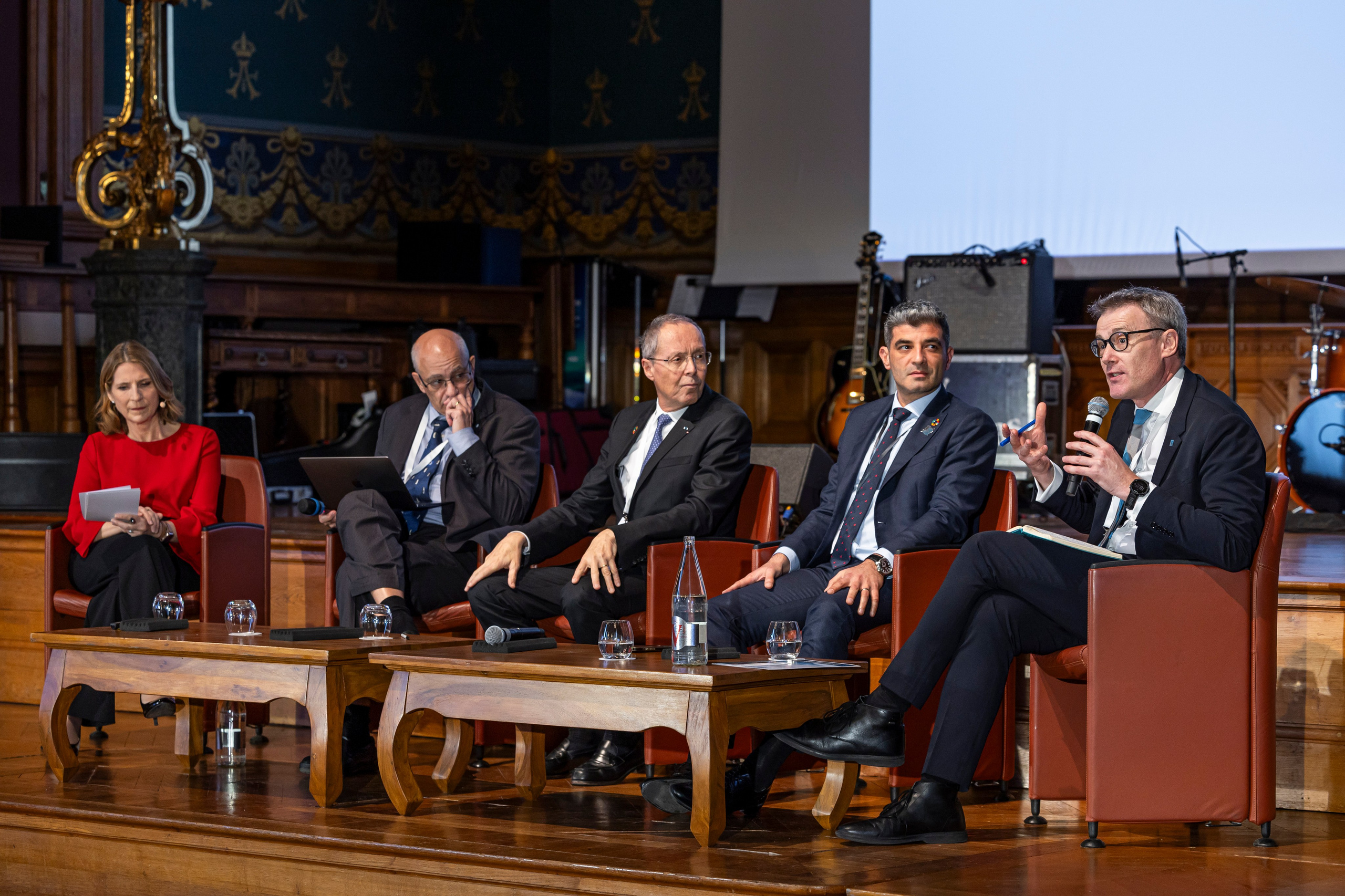
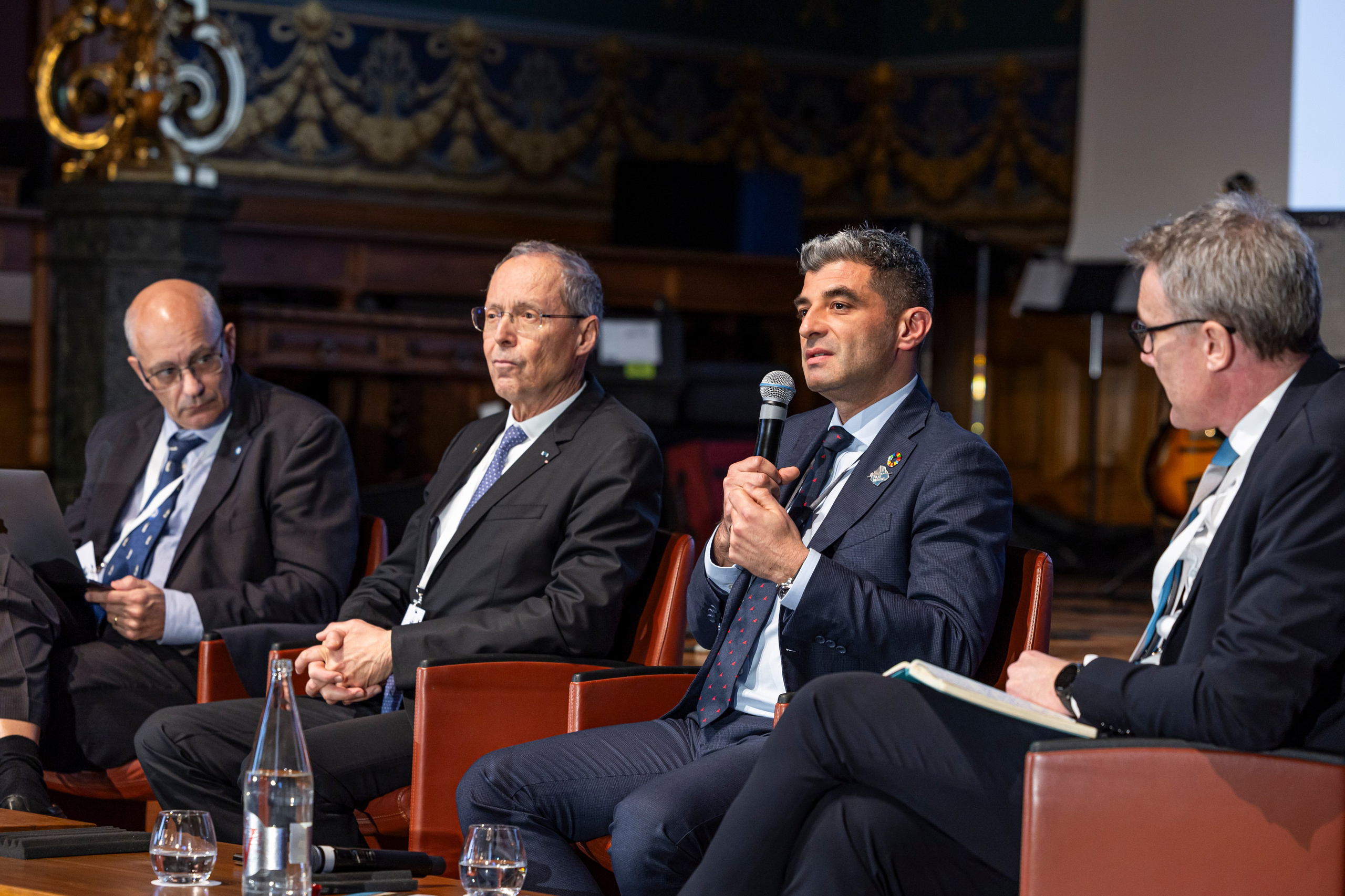
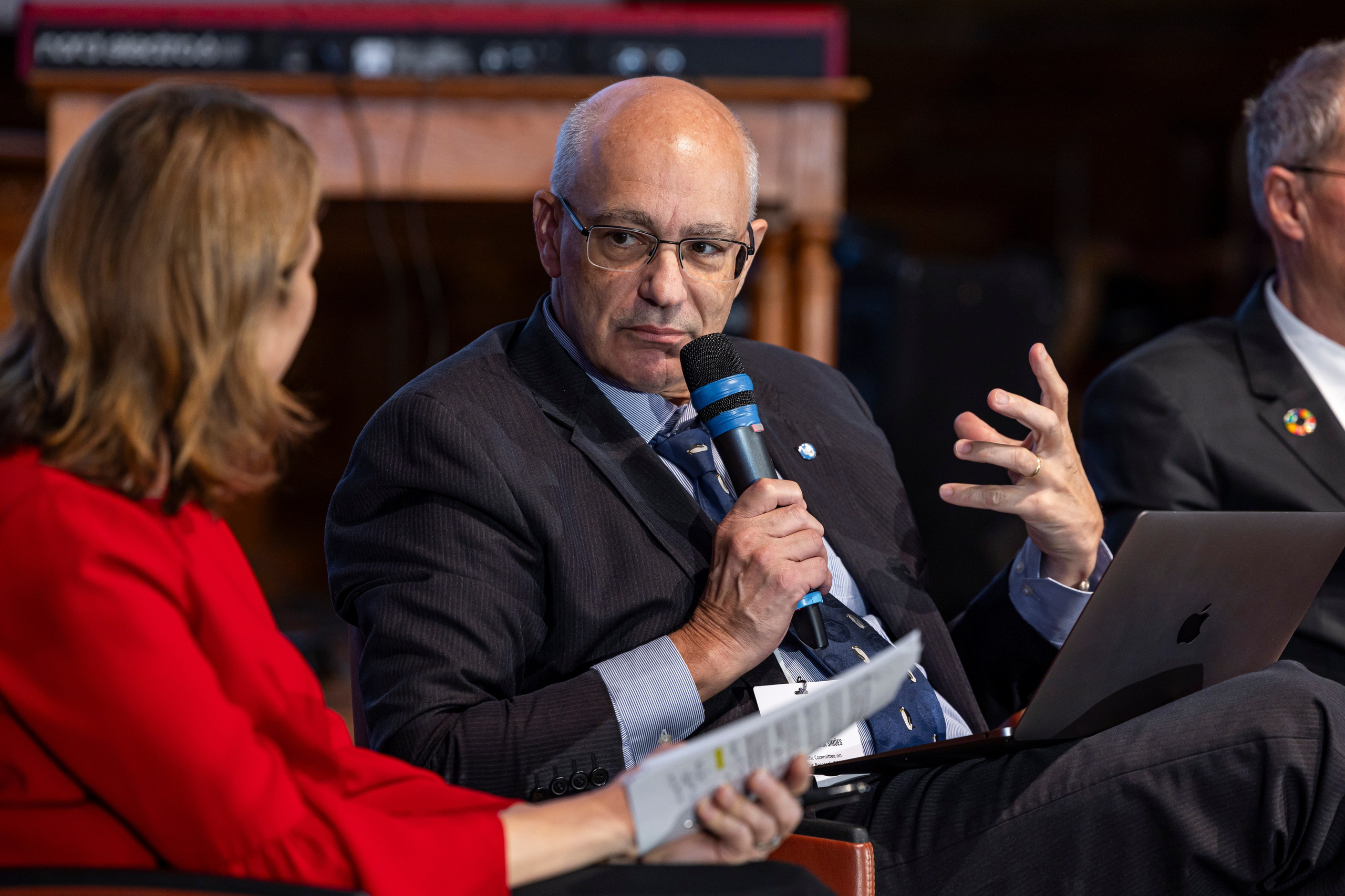
Closing Session by the Organizers
- Jefferson Cardia Simões, Vice President for Finance, Scientific Committee on Antarctic Research (SCAR)
- Henry Burgess, President, International Arctic Science Committee (IASC)
- Olivier Wenden, Vice President and CEO, Prince Albert II of Monaco Foundation
- Robert Calcagno, CEO, Oceanographic Institute, Prince Albert I of Monaco Foundation
During the closing session, speakers underscored the significance of the Polar Symposium as a vital platform for dialogue among the scientific communities of both poles. This dialogue encourages scientists to reevaluate their views on these regions, highlighting the necessity for a broader conversation with various stakeholders, including policymakers, the private sector, and the public, to alter perceptions regarding the impact of climate change on politics and economics. The emphasis was on the crucial role of private sector engagement. One challenge identified is the perception of the polar regions as remote and disconnected, compounded by a general lack of public understanding. Additionally, early career researchers face difficulties in obtaining permanent positions, despite their critical role in the advancement of polar research. Meanwhile, leaders from polar foundations stressed the need for a new generation of scientists, engineers, and logistics leaders in the polar fields.
Olivier Wenden’s presentation on the Prince Albert II of Monaco Foundation and the Polar Initiative, launched in 2022, highlighted the importance of fostering dialogue between scientific research and decision-making at public, state, and private levels. The Initiative prioritizes a science-focused strategy, extending its efforts to include lobbying, enhancing the skills and opportunities for early career researchers and Indigenous and local communities, and supporting ground-level projects. The Foundation’s approach, termed the “3 Cs, ” focuses on complexity, creativity, and the common good, with an aim to broaden partnerships with entities like the Albedo Foundation and the World Economic Forum.
Robert Calcagno spoke about a recent Antarctic expedition to the remote Danger Islands and Joinville Island Group at the northeastern tip of the Antarctic Peninsula. The expedition’s research, including penguin studies and landscape analyses using drones, will aid in lobbying for the establishment of marine protected areas in the Southern Ocean. This comprehensive strategy demonstrates the integrated efforts necessary to comprehend and safeguard the polar regions, blending science, innovation, and advocacy for a better future on our planet.
Text: Elena Adasheva/PREI. Photo: Philippe Fitte/FPA2
Read more about the Polar Symposium 2024. Watch recordings of Day 1 and Day 2.